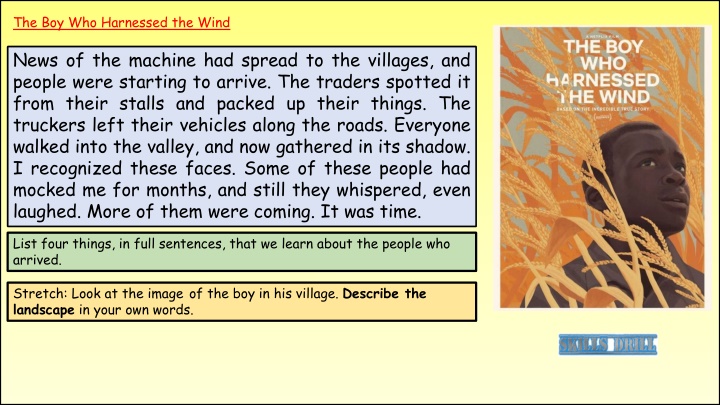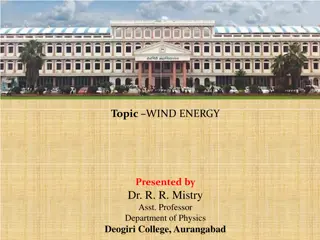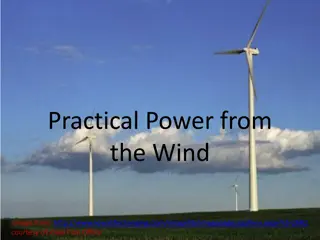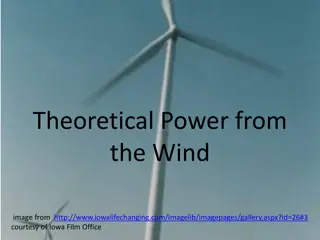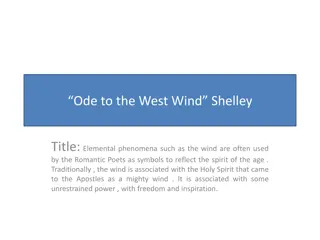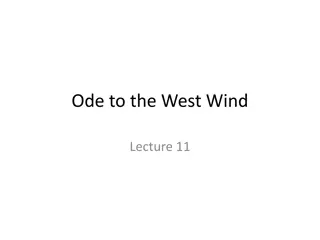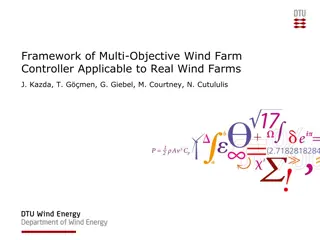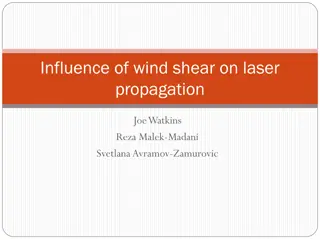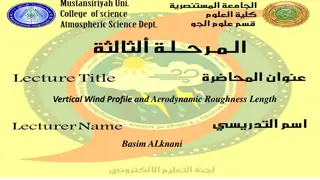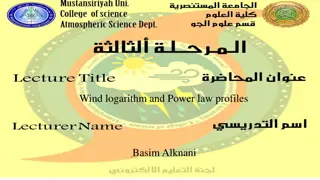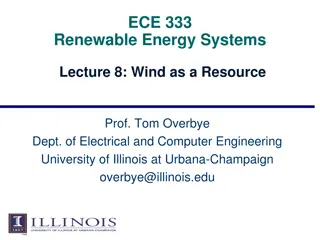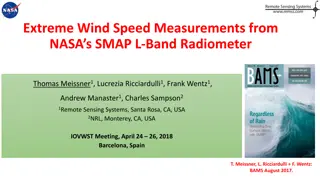The Boy Who Harnessed the Wind: A Story of Innovation and Perseverance
In rural Malawi, a young boy named William Kamkwamba builds a windmill out of scraps to save his village from drought and famine. Despite facing skepticism and challenges, William's determination leads to success, educational opportunities, and hope for his community's future.
Download Presentation

Please find below an Image/Link to download the presentation.
The content on the website is provided AS IS for your information and personal use only. It may not be sold, licensed, or shared on other websites without obtaining consent from the author.If you encounter any issues during the download, it is possible that the publisher has removed the file from their server.
You are allowed to download the files provided on this website for personal or commercial use, subject to the condition that they are used lawfully. All files are the property of their respective owners.
The content on the website is provided AS IS for your information and personal use only. It may not be sold, licensed, or shared on other websites without obtaining consent from the author.
E N D
Presentation Transcript
The Boy Who Harnessed the Wind News of the machine had spread to the villages, and people were starting to arrive. The traders spotted it from their stalls and packed up their things. The truckers left their vehicles along the roads. Everyone walked into the valley, and now gathered in its shadow. I recognized these faces. Some of these people had mocked me for months, and still they whispered, even laughed. More of them were coming. It was time. List four things, in full sentences, that we learn about the people who arrived. Stretch: Look at the imageof the boy in his village. Describe the landscape in your own words.
Born in Kasungu, Malawi, Will Kamkwamba is a young schoolboy who comes from a family of farmers who live in the nearby village of Wimbe. With the use of discarded motor parts, a PVC pipe and an old bicycle wheel, Kamkwamba created a windmill to harness one of the only resources available to the people of Malawi: wind. Although he is soon banned from attending school due to his parents' inability to pay his tuition fees, William blackmails his science teacher into letting him continue attending his class and have access to the school's library where he learns about electrical engineering and energy production. By the mid-2000s, the family's crops fail due to drought and the resulting famine devastates William's village. People soon begin abandoning the village, and William's sister elopes with his former teacher in order to leave her family. Seeking to save his village from the drought, William devises a plan to build a windmill to power an electric water pump that he had scavenged earlier. William requires his father, Trywell, to give permission to dismantle the family bicycle for parts, which is the only bicycle in the village and the family's last major asset. His father believes the exercise futile and destroys the prototype and forces William to toil in the fields. After William's dog dies of starvation and hope seems lost, William's mother, Agnes, intervenes and urges his father to reconsider. William and his father reconcile after William buries his dog. With the help of his friends and the few remaining members of the village, they build a full-size wind turbine which leads to a successful crop being sown. Word of William's windmill spreads and he is awarded a scholarship to attend school, ultimately receiving a degree from Dartmouth College. Summarise in your own words your understanding of the story. Firstly, we learn that Afterwards, we are told that Finally https://www.youtube.com/watch?v=nPkr9HmglG0
The preparation was complete, so I waited. The muscles in my arms still burned from having worked so hard, but now I was finished. The machinery was bolted and secured. The tower was steady and unmoving under the weight of twisted steel and plastic. Looking at it now, it appeared exactly as it was something out of a dream. News of the machine had spread to the villages, and people were starting to arrive. The traders spotted it from their stalls and packed up their things. The truckers left their vehicles along the roads. Everyone walked into the valley, and now gathered in its shadow. I recognized these faces. Some of these people had mocked me for months, and still they whispered, even laughed. More of them were coming. It was time. Balancing the small reed and wires in my left hand, I used the other to pull myself onto the tower's first rung. The soft wood groaned under my weight, and the compound fell silent. I continued to climb, slowly and assuredly, until I was facing the machine's crude frame. Its plastic arms were burned and blackened, its metal bones bolted and welded into place. I paused and studied the flecks of rust and paint, how they appeared against the fields and mountains beyond. Each piece told its own tale of discovery, of being lost and found in a time of hardship and fear. Finally together now, we were all being reborn. Two wires dangled from the heart of the machine and gently danced in the breeze. I knotted their frayed ends together with the wires that sprouted off the reed, just as I'd always pictured. Down below, the crowd cackled like a gang of birds. "Quiet down," someone said. "Let's see how crazy this boy really is." A sudden gust muffled the voices below, then picked up into a steady wind. It took hold of my T-shirt and whistled through the tower rungs. Reaching over, I removed a bent piece of wire that locked the machine's spinning wheel in place. Once released, the wheel and arms began to turn. They spun slowly at first, then faster and faster, until the force of their motion rocked the tower. My knees buckled, but I held on. Don't let me down. I gripped the reed and wires and waited for the miracle. Finally it came, at first a tiny light that flickered from my palm, then a surging magnificent glow. The crowd gasped and shuddered. The children pushed for a better look. "It's true!" someone said. "Yes," said another. "The boy has done it. Before I discovered the miracles of science, magic ruled the world. Magic and its many mysteries were a presence that hovered about constantly, giving me my earliest memory as a boy the time my father saved me from certain death and became the hero he is today. Summarise in one sentence what has happened.
I was six years old, playing in the road, when a group of herd boys approached, singing and dancing. This was in Masitala village near the city of Kasungu, where my family lived on a farm. The herd boys worked for a nearby farmer who kept many cows. They explained how they'd been tending their herd that morning and discovered a giant sack in the road. When they opened it up, they found it filled with bubble gum. Can you imagine such a treasure? I can't tell you how much I loved bubble gum. "Should we give some to this boy?" one asked. I didn't move or breathe. There were dead leaves in my hair. "Eh, why not?" said another. "Just look at him." One of the boys reached into the bag and pulled out a handful of gumballs, one for every color, and dropped them into my hands. I stuffed them all in my mouth. As the boys left, I felt the sweet juice roll down my chin and soak my shirt. The following day, I was playing under the mango tree when a trader on a bicycle stopped to chat with my father. He said that while on his way to the market the previous morning, he'd dropped one of his bags. By the time he'd realized what had happened and circled back, someone had taken it. The bag was filled with bubble gum, he said. Some fellow traders had told him about the herd boys passing out gum in the villages, and this made him very angry. For two days he'd been riding his bicycle throughout the district looking for the boys. He then issued a chilling threat. "I've gone to see the sing'anga, and whoever ate that gum will soon be sorry." The sing'anga was the witch doctor. I'd swallowed the gum long before. Now the sweet, lingering memory of it soured into poison on my tongue. I began to sweat; my heart was beating fast. Without anyone seeing, I ran into the blue gum grove behind my house, leaned against a tree, and tried to make myself clean. I spit and hocked, shoved my finger into my throat, anything to rid my body of the curse. I came up dry. A bit of saliva colored the leaves at my feet, so I covered them with dirt.But then, as if a dark cloud had passed over the sun, I felt the great eye of the wizard watching me through the trees. I'd eaten his juju and now his darkness owned me. That night, the witches would come for me in my bed. They'd take me aboard their planes and force me to fight, leaving me for dead along the magic battlefields. And as my soul drifted alone and forsaken above the clouds, my body would be cold by morning. A fear of death swept over me like a fever.I began crying so hard I couldn't move my legs. The tears ran hot down my face, and as they did, the smell of poison filled my nose. It was everywhere inside me. I fled the forest as fast as possible, trying to get away from the giant magic eye. I ran all the way home to where my father sat against the house, plucking a pile of maize. I wanted to throw my body under his, so he could protect me from the devil. It was me," I said, the tears drowning my words. "I ate the stolen gum. I don't want to die, Papa. Don't let them take me!" Summarise in one sentence what has happened.
My father looked at me for a second, then shook his head. "It was you, eh?" he said, then kind of smiled. Didn't he realize I was done for? "Well," he said, and rose from the chair. His knees popped whenever he stood. My father was a big man. "Don't worry. I'll find this trader and explain. I'm sure we can work out something." That afternoon, my father walked eight kilometers to a place called Masaka where the trader lived. He told the man what had happened, about the herd boys coming by and giving me the stolen gum. Then without question, my father paid the man for his entire bag, which amounted to a full week's pay. That evening after supper, my life having been saved, I asked my father about the curse, and if he'd truly believed I was finished. He straightened his face and became very serious. "Oh yes, we were just in time," he said, then started laughing in that way that made me so happy, his big chest heaving and causing the wooden chair to squeal. "William, who knows what was in store for you?" My father was strong and feared no magic, but he knew all the stories. On nights when there was no moon, we'd light a lamp and gather in our living room. My sisters and I would sit at my father's feet, and he'd explain the ways of the world, how magic had been with us from the beginning. In a land of poor farmers, there were too many troubles for God and man alone. To compensate for this imbalance, he said, magic existed as a third and powerful force. Magic wasn't something you could see, like a tree, or a woman carrying water. Instead, it was a force invisible and strong like the wind, or a spider's web spun across the trail. Magic existed in story, and one of our favorites was of Chief Mwase and the Battle of Kasungu.In the early nineteenth century, and even today, the Chewa people were the rulers of the central plains. We'd fled there many generations before from the highlands of southern Congo during a time of great war and sickness, and settled where the soil was reddish black and fertile as the days were long. Summarise in one sentence what has happened.
Write a story about your hometown You could include any interesting landscape features You could describe the climate You could describe any local legends or myths You could describe the people of your hometown You have five adjectives in your work You have three adverbs in your work You start a sentence with a verb You have used a metaphor or simile
What knowledge have you learnt? What skill have you practiced? How has your previous learning helped you?
